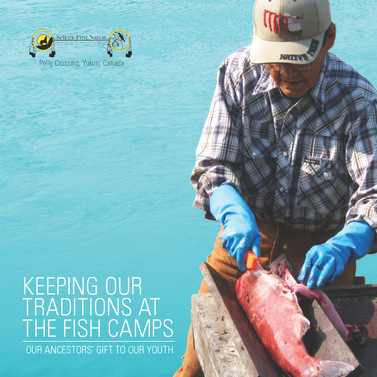Selkirk, Yukon

Year(s) Funded: 2015-2016
Topic Area: Mental Health Contact: Marilyn Van Bibber, Arctic Institute of Community-Based Research ([email protected]) Partners: Arctic Institute of Community-Based Research, Selkirk First Nation, Selkirk First Nation Youth and Elders, Selkirk Spirit Dancers, Eliza Van Bibber School Website: http://www.aicbr.ca Title: Keeping Our Traditions for the Health and Wellbeing of Future Selkirk First Nation Generations: "What do we do at the fish camp when there is no fish?"
Action: This project aimed to develop a viable community-based adaptation strategy for keeping traditions alive, in particular, in continuing fish camps even when there are no fish in the rivers, and to ensure the health and mental wellbeing of youth people and future generations. Many northern communities consider traditional practices as a pathway to mental health and wellness for First Nation youth. The main focus of this project was to find ways of keeping traditional Tutchone knowledge, practices and culture while adapting to the threat of climate change. Fish camps are an important part of the mental, physical, emotional and spiritual well-being of the people. There are many traditions they can teach at fish camps even when there are no fish. First Nations peoples have always lived off the land and so they can adapt to these challenges. The main concern of Selkirk citizens is for the wellbeing of the next generations: that they will be able to continue in the traditions of hunting, fishing and gathering and to follow the traditional laws of their ancestors. Results: This project has deepened the understandings of traditional ecosystems, knowledge and practices, particularly as they relate to how the fish camp is impacted by climate change. A key aspect of this research was to increase community capacity to perform their own research and engage Selkirk First Nation youth in seeking answers to important community issues. An education and training workshop taught youth about community-based participatory research methodology, communication and life skills and climate change as it relates to the role of fish camps and mental health of Tutchone people. Outputs: Developed Selkirk First Nation Climate Change Adaptation Plan and created a Fish Camp guide, a form of cultural preservation, to facilitate conversations around activities to do at the fish camp and connecting the youth to the land as well as to enable sharing of traditional knowledge and skills traditionally taught at the fish camp. Additional Resources & Publications
https://www.youtube.com/watch?v=83w3iBDK684
http://www.aicbr.ca/selkirk-project/?rq=fish https://static1.squarespace.com/static/56afc7218259b53bd8383cb8/t/57ab923e59cc68307527742f/1470861914849/Selkirk+Climate+Change+Adaptation+Plan_CommunityReport_final%5B2%5D.compressed.pdf https://static1.squarespace.com/static/56afc7218259b53bd8383cb8/t/57ab99565016e1a671356e60/1470863767066/SFN+Fish+Camp+Book.compressed.pdf |
‘This is for my grandchild. Like, I’m fighting for her. She needs this land for the future and everything I do – when I talk, I talk for [her]. I want her to have this land and we look after it for her – my grandchild. And you look after the animals; you look after the birds; you look after the fish. Always look after the water. Look after the trees.’ – Fish Camp Participant |
